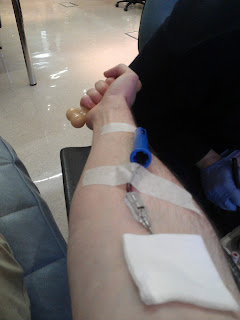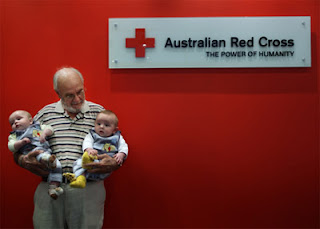Most chairs in the Irish Blood Transfusion Service's D'Olier Street office are designed to serve from the crook of the left elbow but reformed southpaws like me can ask to donate from their right arm. It's useful - one's elbow can be a little stiff immediately after donating and I do tend to rely on my left.
The view is spectacular, their canteen's location three stories above O'Connell Bridge affords an uninterrupted view of our nation's main thoroughfare at an angle that minimises the fast food restaurants and highlights architecture not visible from tourist buses. I tried several times to capture it by photograph but the window-reflected canteen interior always ruins the shot. I hope the absence of a photo whets your curiosity - you really should go see it for yourself.
I've donated blood, to the best of my memory, some sixteen times to date and I look forward to my next appointment. It takes but an hour of my time, has some health benefits and costs me nothing.
I'll admit to a little pride in these small efforts. As a universal donor my blood (unlike my blog) is palatable to all my fellow humans and my type O negative can be delivered in crisis situations without the time-consuming necessity of checking the patient's type. When I do take my seat and hold a chewy dog treat as pictured I am connected to not one bag but six, the load spread over a half dozen smaller containers designed for use in neonatal care.
Hoping each of my donations were used before they spoiled and assuming they all reached their intended audience I find myself edging close to a hundred miniature patients to whom I've rendered some assistance. I cannot in good faith offer prayer to those who are unwell, but I like to think that blood donation gives we godless some access to the same feelings of offering up something of ourselves for the good of others, and the hope that what we contribute can aid in another's healing. I take comfort in knowing that my blood type and high blood iron give me advantages with which I can help my fellow members of humanity.
There are others with much greater gifts than I, and far stronger records for donating. James Harrison first offered up a pint following his eighteenth birthday in 1954. When analysed his blood was found to contain Rho(D) Immune Globulin, a remarkably effective preventative of the sometimes fatal and always dangerous Rhesus disease. Using a system of plasma donation Harrison is able to donate every two to three weeks and has supplied enough of the compound to save the lives of an estimated 2.4 million babies.
2.4 million.
For scale, the population of Dublin is a little under 1.3 million and if all this blog post does is to make you aware of this truly remarkable individual then I am happy I invested the time to tell you his tale. Parents worldwide are grateful to him. He has been honoured by his government and nominated for Australian of the year. His tale is legendary in blood donation circles. His own daughter was a recipient of his antibodies at birth. We can but stand in awe of both his gift and generosity, and the support he has so freely given to so many.
There is doubtless a distinction to be drawn between cis men and women when it comes to procreation. I will never nurture new life or give of myself in an intensely public fashion to the benefit of a future member of society. The joys and pains, the inspiring hopes and dashed dreams, and the sensation of life growing inside oneself that represent the full gamut of potential experiences are all areas I will experience from the degree of separation no cis man can cross. I do not have Harrison's gift: my contributions have touched a paltry 0.004% of the lives his has. This is the closest those of us absent wombs can come to pregnancy, and I will be the first to acknowledge that our best efforts cannot take us to within sight of what mothers give.
I am thankful that I can give this gift freely. No law compels Harrison or I to donate. Were we to require surgery that would void our approval for future donations we would not be forced to retain legal counsel. Our medical care will never be divided into permissible but regretted treatments to prevent our death, or proscribed treatments that merely prevent our disability - judged an acceptable price we must pay so that we might persevere in our donations.
Should I cease donating now the system would weather my absence. Should Harrison call to an end his generosity the medical treatment of others would surely suffer. If he - now in his mid seventies - were to decide that the moment is opportune to receive his first tattoo he would voluntarily exclude himself from donating for half a year. This would be a significant loss, yet no protesters would wave graphic placards outside his place of work or residence. When I excluded myself from donating for a full year by visiting the Amazon jungle I was not considered a monster, and no one highlighted the 24 empty blood bags I could otherwise have filled.
We recognise that blood donors give freely of themselves for the benefits of others. We thank them for the contributions they make and admire their empathy for their fellow members of humanity. We would not dream of applying the force of law to compel them, and although we may disagree with the decisions of some not to donate we recognise that it is their choice, and not a matter for public shaming.
Perhaps some day we'll treat women the same way.


No comments:
Post a Comment